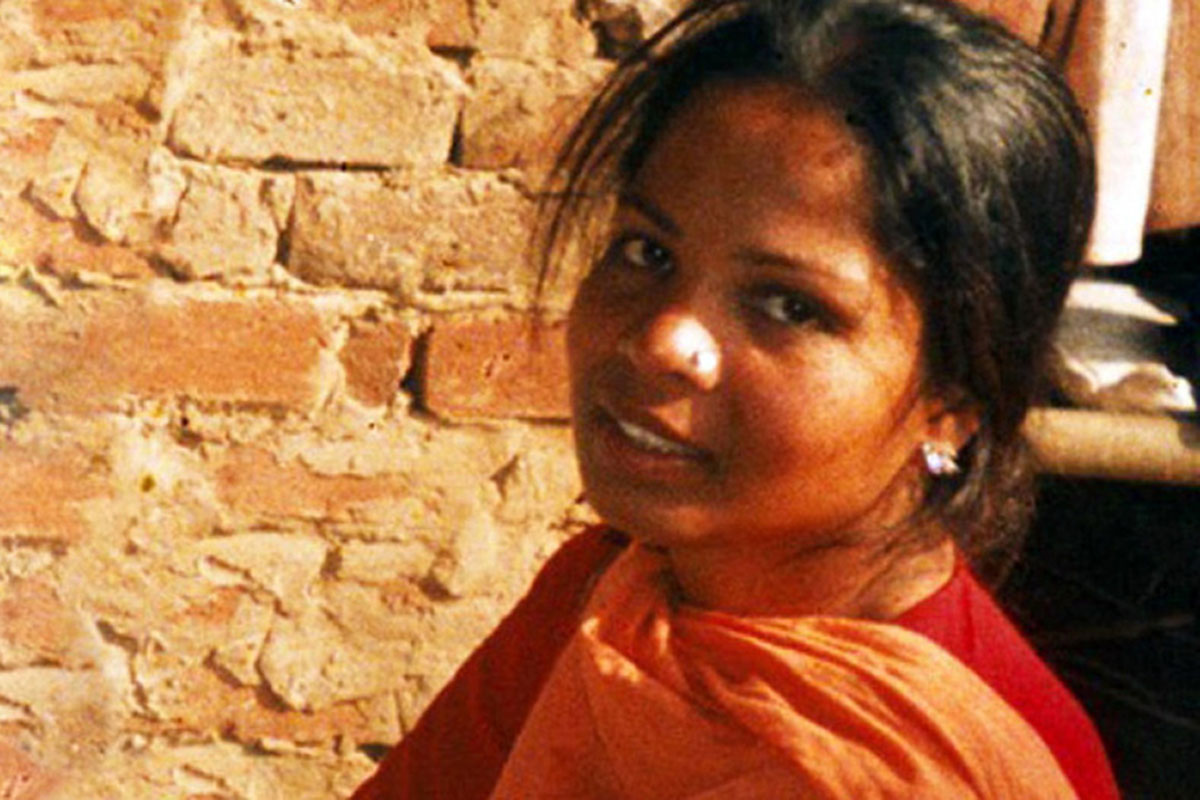Chief Justice to hear Asia Bibi’s case

Pakistan’s Chief Justice announced in April he will personally preside over Asia Bibi’s case, and will hear it soon.
Justice Mian Saqib Nisar also ordered full police protection for Asia’s lawyer, Saif-ul-Malook.
“Be ready, Saif-ul-Malook. I am going to fix your case soon and I myself will preside over the bench,” Nisar said, the Catholic news service UCAN reported.
Pakistan’s Supreme Court has a backlog of over 38,000 cases. Chief Justice Nisar said all criminal appeals will be decided by July. Since he became chief on Dec 31, 2016, Nisar has gained a reputation for tackling tough cases, including extrajudicial killings, human rights, money laundering, and the state of health facilities.
Asia’s case was scheduled to be heard in 2016 but was postponed when one of the judges recused himself. Islamists threatened to riot if Asia’s death sentence was overturned and thousands of police were deployed in anticipation in Islamabad.
Asia Bibi, an uneducated Christian day-laborer, was sentenced to death after two Muslim women accused her of blasphemy. She’s been in prison since 2009.
Asia testified that they had been picking berries when she fetched water and offered it to the Muslim women. The women refused, saying they never took water from the hand of a Christian. This led to a quarrel. The women told a village cleric, who filed a police report five days later accusing Asia of making derogatory remarks against Muhammad.
Pakistan’s then-President Asif Ali Zardari planned to pardon Asia and immediately fly her out of the country, Ali Dayan Hasan with Human Rights Watch told Al-Jazeera. But three weeks after she was sentenced to death and before a pardon could be issued, the Lahore High Court ordered the president and Gov. Salmaan Taseer not to issue a pardon.
“Nobody had anticipated that any court of the land could ban the president from pardoning her. This was brazenly unconstitutional,” Hasan said.
Gov. Taseer, a Muslim, was assassinated for standing up for Asia and opposing blasphemy laws, as was another government official Shahbaz Bhatti, a Christian.
Taseer was shot 28 times by his bodyguard, who was treated as a hero and showered with rose petals. The chief justice of the Lahore High Court – who was responsible for prohibiting a presidential pardon for Asia – retired and defended Taseer’s assassin.
Unjust Laws
“In more than 80 percent of reported cases, those accused of blasphemy are eventually acquitted on appeal, with judges expressly stating in a large majority of such cases that the complaint was fabricated and spurred on by personal vendettas,” according to a study on Pakistan’s blasphemy laws by the International Commission of Jurists.
Asia’s case spurred the appeals court that ruled against her to later ask Pakistan’s government to reform the court rules used in blasphemy cases to require the accusers to meet high standards of piety and integrity. In Asia’s case, her attorney was afraid to cross-examine the Muslim accusers on the alleged derogatory comments because repeating them could leave him vulnerable to accusations of blasphemy.
But attempts to reform the blasphemy laws have sparked opposition and massive protests in Pakistan’s capitol of Islamabad.
“After the assassinations of Salmaan Taseer and Shahbaz Bhatti, the government backed down in its efforts,” to repeal the laws, Hasan said.
Religious Freedom for Christians in Pakistan
Pakistan’s Constitution guarantees religious freedom, stating, “Subject to law, public order and morality, every citizen shall have the right to profess, practice and propagate his religion.” But this is not a reality for religious minorities who fear accusations of blasphemy, a crime punishable by life imprisonment or death.
In 2014, after the bombing of All Saints’ Memorial Church which killed 127 people, then-Chief Justice Tasadduq Hussain Jillani issued instructions to the government to:
- Constitute a team at a federal level to develop a strategy for promoting religious tolerance.
- Develop appropriate curricula for primary, secondary and tertiary levels of education that promote religious harmony and tolerance.
- Curb hate speech in social media.
- Constitute a national council for minorities.
- Establish a special police force to protect the worship places of minorities.
- Enforce the 5 per cent minority quota in government jobs.
- Prompt action, including registration of a criminal case, whenever constitutional rights of religious minorities are violated or their worship places are desecrated.
Other than recommendations on curriculum to encourage students to learn Islam’s “spirit of pluralism,” nothing has been done, according to Ramesh Kumar Vankwani, a member of the Pakistan National Assembly.
U.S. Response to Pakistan
The U.S. placed Pakistan on a special watch list for “severe violations of religious freedom” under the International Religious Freedom Act in January 2018.
In an unrelated action, the U.S. suspended nearly $1 billion in military assistance. In his first tweet of 2018, President Trump said of Pakistan, “They give safe haven to terrorists we hunt in Afghanistan, with little help. No more!”
Ask your U.S. senators to support Senate Resolution 109 “Encouraging the Government of Pakistan to release Aasiya Noreen, internationally known as Asia Bibi, and reform its religiously intolerant laws regarding blasphemy.”
Christians and other religious minorities live in constant fear of false accusations of blasphemy, which carries a mandatory sentence of life imprisonment or death.
Even though ordered by Pakistan’s chief justice to develop a national strategy to promote religious tolerance, Pakistan’s government still has not instituted reforms. Pakistan’s reputation for harboring terrorists and refusing to promote religious tolerance for its religious minorities breeds violence inside and beyond its borders.
Asia Bibi’s case has made clear to the world that Pakistan’s blasphemy laws and religious intolerance are symptoms of a legal system and culture that endangers all. Religious tolerance is key to national security as well as human dignity.
The U.S. has withheld nearly $1 billion in funding to Pakistan. We can also deliver a clear message to Pakistan that it must promote religious freedom.
Dear Senator,
Asia Bibi is still in prison, sentenced to death, due to Pakistan’s unjust blasphemy laws. Christians and other religious minorities live in constant fear of false accusations of blasphemy, which carries a mandatory sentence of life imprisonment or death.Even though ordered by Pakistan’s chief justice to develop a national strategy to promote religious tolerance, Pakistan’s government still has not instituted reforms. Pakistan’s reputation for harboring terrorists and refusing to promote religious tolerance for its religious minorities breeds violence inside and beyond its borders.
Asia Bibi’s case has made clear to the world that Pakistan’s blasphemy laws and religious intolerance are symptoms of a legal system and culture that endangers all. Religious tolerance is key to national security as well as human dignity.
The U.S. has withheld nearly $1 billion in funding to Pakistan. We can also deliver a clear message to Pakistan that it must promote religious freedom.
Please support Senate Resolution 109 encouraging Pakistan to release and ensure the safety of Asia Bibi, and to reform its religiously intolerant blasphemy laws.
Thank you.
